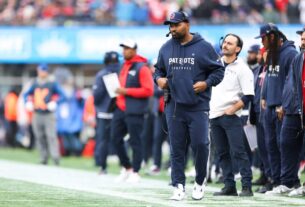Super Bowl-winning coaches Bill Belichick and Pete Carroll are potentially closer to Canton as the Pro Football Hall of Fame has revised its selection process, reducing the time a coach must wait to become eligible for enshrinement. But other changes to the process could raise the bar for enshrinement.
Coaches now will only have to wait a year for eligibility after retirement as opposed to the previous five-year period, the Hall of Fame announced Friday.
Although Belichick hasn’t officially retired from coaching after parting ways with the New England Patriots earlier this year, the changes could see him being fitted for a bust in 2026 should he decide to call it a career — the same with Carroll who parted ways with the Seattle Seahawks following the 2023 season.
The revisions also include another benefit for coaches as it separates them from the contributors category, meaning their candidacy will only be judged against other coaches. The change ensures that at least one coach and one contributor will be among the 20 finalists the Selection Committee will discuss and vote on when it meets ahead of the Super Bowl.
While Belichick in particular figures to breeze into the Hall the first time he’s eligible, the changes announced could narrow the path for coaches and contributors whose credentials are not as strong.
The new process will send three Senior candidates (players retired at least 25 years), one coach and one contributor to the finalist stage. Once those five are identified, selectors will cast ballots for three of them, with an 80 percent approval rate required for any candidate to earn selection. Vote splitting could make it more likely for only one or two of the maximum three to advance. The process will pit players against coaches and contributors, a setup that has in the past favored players.
The five slots available to modern-era candidates also could be harder to secure under the new format. In the past, selectors reduced from 15 finalists to 10 to five. Once the final five were identified, selectors voted “yes” or “no” on each of the final five, and any with 80 percent “yes” votes was enshrined. Under the new setup, selectors will reduce from 15 finalists to 10 to seven. At that point, voters will pick their final five, with only those candidates receiving 80 percent approval earning enshrinement. Vote splitting makes it more likely for candidates to miss the bar for enshrinement.
The revisions also call for the formation of two 11-person screening committees comprised of members not on the selection committee that will separately review the full list of nominees. They’re set to take effect beginning with the Class of 2025.
Which contributors could this benefit?
Among the contributors who could be near the front of the line based on past votes are Roone Arledge, Robert Kraft, Bucko Kilroy, Art Rooney Jr., Clark Shaughnessy, Lloyd Wells and John Wooten. But past votes aren’t always an indicator of future votes in sub-committee selections — Pompei
Kraft’s chances for becoming a finalist improved now that he doesn’t have to compete with coaches. However, the fact that he’ll have to compete with long-retired players and a coach for three spots makes it difficult to predict what might happen. — Sando
Required reading
(Photo: Maddie Meyer / Getty Images)





